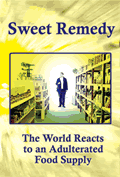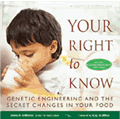THE CODEX COMMITTEE ON FOOD LABELING MEETS IN QUEBEC
by
Scott Tips, JD
May 14, 2010
NewsWithViews.com
From May 3-7, 2010, the Codex Committee on Food Labelling (CCFL) held its 38th Session in Quebec City, Canada, under the chairmanship of Mr. Paul Mayers. The Canadian government is the host of this particular committee and has provided Mr. Mayers as the chairman for the last several years. The National Health Federation (NHF) has been attending CCFL meetings for even longer and is well-known for being outspoken on several of its agenda items, but especially on the one concerning the disclosure on labels of genetically-modified (GM) food ingredients.
The GM Label Issue
As you may recall, the question of whether or not GM foods should be labeled so that the consumer may know what he or she is buying has been a hot issue at CCFL for many years now. At past meetings, the Western Hemispheric countries (Canada, the United States, Mexico, Costa Rica, and Argentina) except Brazil have taken a united stand against the mandatory labeling of GM food products because they have known that consumers, by a large majority, are reluctant to buy GM foods.
So, for years these countries’ delegations at Codex have been opposing GM labeling so they can push their GM-rich crops on unsuspecting consumers. As U.S. delegation head Dr. Barbara Schneeman said several meetings ago, “The consumer is too ignorant to know the difference between GM and non-GM foods.” They are supported by two industry INGOs known as the Biotechnology Industry Organization (BIO) and the International Council of Grocery Manufacturers (ICGMA).
On the other hand, the “good guys” are those who want the consumer to be informed, that is, to have the choice when shopping to know when he or she is buying GM foods. These good guys, who have taken a consistently strong stand in favor of GM labeling, are the European Union, Brazil, France, Germany, Italy, Norway, Switzerland, Morocco, Kenya, Cameroun, Ghana, Mali, and the Republic of Korea, supported by the INGO delegations of Consumers International (Dr. Michael Hansen), International Baby Food Action Network (IBFAN) (Elisabeth Sterken), and of course the National Health Federation. The Indian delegation – a supporter of GM-food labeling – could not, unfortunately, make this meeting.
The Meeting
By Monday, May 3rd, the first day of the CCFL meeting, a few people were quickly – I would say definitely prematurely – broadcasting to the World that the U.S. delegation was taking a hard stance against GM-food labeling and the end for GM-food labeling was near. Yet, while people were hearing this “woe is me” information about the Quebec CCFL meeting even before the GM-labeling issue had started to be discussed, the truth was actually quite different. Once the issue came up for discussion and debate on the CCFL meeting agenda, it became clear that far from being a situation where the anti-GM food labeling forces were advancing, they were in headlong retreat.
The
NHF can speak authoritatively about what happened since it has been
in the thick of the fight on this issue, even attending the special,
closed Codex meeting that was held during the lunch break on Wednesday,
May 5th. The NHF has the right to attend these special and regular Codex
meetings due to its INGO-accredited status with Codex. Our outspoken
and strong stance that GM foods should be labeled as such so that the
consumer can make an informed purchase pleased our allies but definitely
hit some very raw nerves as a number of delegates screamed at me during
the Wednesday-lunch breakout session. They disagreed with my statement
that so-called “safety” studies on GM foods were not to
be trusted.
But the screaming came more from the fact that the opposition was losing
than from anything else. For the
truth is that on this Codex issue, we are winning. It might seem
glacially slow, even imperceptible, to an outside observer; but NHF
can tell you that the momentum is steadily in our favor and direction.
The Other Side is Falling Apart
The
coalition of forces wanting to hide the fact that they are selling GM
foods is in disarray and falling apart. The Codex delegations of Australia
and New Zealand were AWOL from this coalition. Quite vocal at past Committee
meetings in opposing GM-food labeling, they were completely quiet at
this week’s session of CCFL, with one exception: Australia actually
spoke out briefly but clearly in favor of a “modern biotechnology”
definition that the pro-GM food-labeling forces favored! That was a
switch.
And, Canada, which in the past had been joined at the hip with the United
States and Mexico, in opposing GM-food labeling, is now starting to
drift apart and chart its own separate path on the issue. In fact, the
coalition of the unwilling could not even properly coordinate and orchestrate
their formerly-strong opposition, as they had so carefully done in the
past. And South Africa made one intervention on the subject matter but
it was not intelligible enough to tease out of the words whether that
delegation was for or against labeling.
Next year, the coalition of the unwilling will be even further disunited, especially after we re-double our efforts to rein in the American and Canadian delegates from disregarding the will of their own citizens, who are solidly in favor of GM-food disclosure.
The Opposition Failed to Stop the GM Label
The anti-GM label forces have wanted this Committee to stop all consideration of this agenda item. Yet, during the CCFL meeting, the pro-GM-food labeling forces beat back the latest (and to date weakest) attempt to stop the consideration process and also stopped the anti-GM label force’s effort to insert misleading language about the “safety” of GM foods into the GM-food labeling disclosure.
While the GM-food labeling did not advance, the wording sought by the pro-label forces was substantially preserved, intact, to be revisited at next year’s meeting. This may not seem significant, but when you consider that the GM-food proponents have been trying to kill this provision for years, it is a victory to survive so that when the moment is right (as we feel it will be at next year’s meeting) we can then take the matter forward along the road to completion.
Last-Minute Confusion
On the last day of each Codex meeting, the draft written report of the meeting is read by the delegates so that they can comment on the report and suggest changes and corrections in the report to the Committee. It is not a time for any new matter to be discussed, only for the report itself to be corrected so that it will most accurately reflect what the Committee said during previous days. This accuracy is important since outsiders will usually only have the written report to go by in knowing what happened at the meeting. Unfortunately, the Codex Alimentarius Commission, in its infinite wisdom, has trended towards even less transparency in its reports than ever before.
Gone now are most of the specific delegation names that would tell the readers who took what position. The reports are so sanitized and shortened as to no longer be much of a history of anything other than the results and even those must be watched carefully to be certain that they are accurately recorded.
For instance, during the regular session’s debate on GM-food labeling, the delegation of Argentina had at one point asked that certain wording that could be interpreted as giving individual countries the right to decide on their own as to whether or not to implement mandatory GM-food labeling be demoted to a lowly footnote and the wording weakened. This was opposed by the NHF and other pro-labeling forces at the meeting. Moreover, I had argued at the time that the structure of the footnote was ambiguous and unintelligible.
Well, lo and behold, when the draft report appeared for reading on the last day, it had a sanitized version of the Argentinean footnote that was actually unambiguous. No delegation made any comment about this discrepancy until the NHF took the floor and pointed out to the Committee that this was not the language we had considered. This caused a long pause in the proceedings until the Chairman and Codex Secretariat had finished consulting their notes and agreed with NHF. Ghana then spoke out to also support the NHF’s position on this point. The original ambiguous language – much more susceptible to attack at next year’s meeting – was reinserted into the report as the footnote of Argentine.
Final Words
Not counting the private session where we spoke out often, the NHF took the floor to speak to the full Committee some 7 to 8 times on this topic, at one point even telling the Committee that “it was a curious situation when the delegate for the European Union spoke more on behalf of American and Canadian consumers than either the American or the Canadian delegates who had no authority to speak on behalf of their citizens since opinion polls showed a vast majority of Americans and Canadians supported the labeling of GM foods.”
And near the end, NHF was able to help stiffen the resolve of several country delegations to reject the false “compromises” offered by the anti-GM labeling forces. These “compromises” had arisen during the lunch-time breakout session chaired by Mr. Mayers, but were all oriented heavily in favor of the anti-labeling forces. During that session, the NHF pointed out to everyone that these so-called compromises were nothing but attempts to subvert the will of the pro-labeling delegations. NHF called upon the country delegations to reject accepting the false compromise, which they did reject.
| Subscribe to the NewsWithViews Daily News Alerts! |
There will be a “facilitated” session taking place in Brussels sometime between this regular meeting and the next one, which session will be chaired by Ghana and facilitated (mediated) by Chairman Mayers, in order to try to reach a compromise of some sort. NHF suspects that this will be the anti-labeling forces’ last-ditch attempt to block GM-food labeling, but NHF will be there to make sure that no false compromises are accepted. Hopefully, the American and Canadian delegations will have changed by then through our consumer efforts, so that they will be allies and no longer opponents of those who seek to advance the consumer’s right to know.
So, the battle continues – but make no mistake, the momentum is in our favor.
� 2010 - Scott Tips - All Rights Reserved















